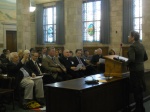I was privileged to be a speaker today (11/30/11) at the NJ Fighting Poverty with Faith: “Working Together to End Hunger” event. This was an inspiring interfaith program held at the NJ State House in Trenton, which included voices of Jewish, Muslim, Christian and Hindu faith traditions. The call to action was eloquently and forcefully delivered by Rev. Lisanne Finston, of Elijah’s Promise Soup Kitchen in new Brunswick. The growing ranks of the poor and near-poor are in great need of our advocacy, activism and leadership. It is not just about feeding the hungry — though, of course it is first about that — it is about a society that helps those who are poor to find their back to independence.
The following were my remarks at the event today:
An editorial in the NY Times last week asked the question: “What is it like to be poor?” Thankfully, most of us do not know how this feels from firsthand experience. But it is very close to home: “One in three Americans — 100 million people — is either poor or perilously close to it.” (NY Times editorial 11/23/11)
Jewish sacred texts struggle with the reality of poverty – throughout the ages our sages have wondered why there are rich and there are poor. A midrash, an interpretive lesson from the text, commenting on Ecclesiastes 7:14, teaches:
“In the day of prosperity, enjoy the prosperity.” (Ecclesiastes 7:14). Rabbi Tanchum bar Chiyya said, “In the day of your fellow man’s prosperity, rejoice with him. And in the day of adversity, reflect. If adversity confronts your fellow, consider how to do him a kindness and save him… But why does God create both poor people and rich people? In order for them to draw riches from each other, as it says, ‘God has made one for the other.’ (Pesikta deRav Kahana.)”
As Tevye said in the Jewish folk tale, Fiddler on the Roof, “It’s no sin to be poor, but it’s not great honor either.” We have mutual responsibility for each other, whether rich or poor. We share this society – and through the sacred obligation of what Jewish tradition calls “tzedakah” – which means “righteous action” but is commonly translated as “charity,” we can change it. Jewish religious law mandates the creation and sustenance of a just, righteous, and compassionate world. We live for the greater good of all of us.
The growing divide between the rich and the poor in America is more than a crisis. It is a moral failing of our society. 49.1 million Americans are below the poverty line and 51 million more are considered to be “near poor” — with incomes less than 50 percent above the poverty line.
“In 2010, just over half of the country’s nearly 17 million poor children lived in households that reported at least one of four major hardships: hunger, overcrowding, failure to pay the rent or mortgage on time or failure to seek needed medical care.” The consequences of these conditions can be staggering, potentially impacting a family for generations.
The inequality in our country is a travesty. As wealth is concentrated at the top of the income scale, poverty spreads and suffering grows.
The quintessential work on the nature of suffering in the Hebrew Bible is the Book of Job. A midrash – an interpretive lesson on this book, imagines the following conversation between God and Job:
“God said to Job, “Which would you prefer – poverty or suffering?” Job responded, “Master of the Universe—I will take all of the sufferings in the world as long as I don’t become poor, for if I go to the marketplace and don’t have any money to buy food, what will I eat?”… This shows us that poverty is worse than all of the other sufferings in the world. (Sh’mot Rabbah 31:12)
We are taught that we are no more worthy than anyone else, and our neighbors who are hungry deserve to be treated with dignity and compassion. The Torah commands us to care for the needy, leaving the corners of our fields, that those who are hungry may come and eat. “…Do not harden your heart and shut your hand against your needy kinsman. 8 Rather, you must open your hand and lend him sufficient for whatever he needs. 11 For there will never cease to be needy ones in your land, which is why I command you: open your hand to the poor and needy kinsman in your land.” (Deuteronomy 15:7-8, 11)
We share a responsibility to care for the needy and to help them to rise up out of poverty. This central spiritual value is a moral imperative.
As people of faith, we know that humility, kindness, and generosity shape a compassionate society. We are committed to working on behalf of those who are struggling. We can’t do it alone. This is the purpose of community, and indeed the value of government – to care for the welfare of its citizens. There is no loftier or more essential purpose to being “One nation, under God, indivisible, with Liberty and Justice for all.” Together we shall lead the movement to fight poverty with faith, to become what we are created to be: caring human beings sharing our world in mutuality and loving-kindness.
To read more about the Fighting Poverty with Faith campaign:
http://fightingpovertywithfaith.com/f2/
To read my Fighting Poverty with Faith blog post on the Rabbis Without Borders Blog:
http://www.myjewishlearning.com/blog/rabbis-without-borders/tag/thanksgiving/

Leave a comment